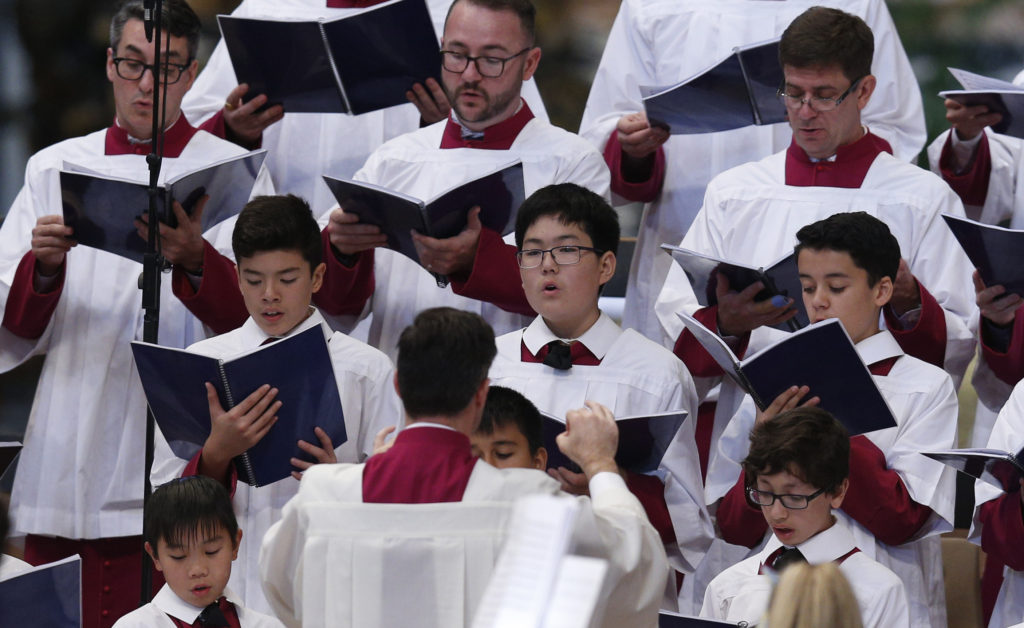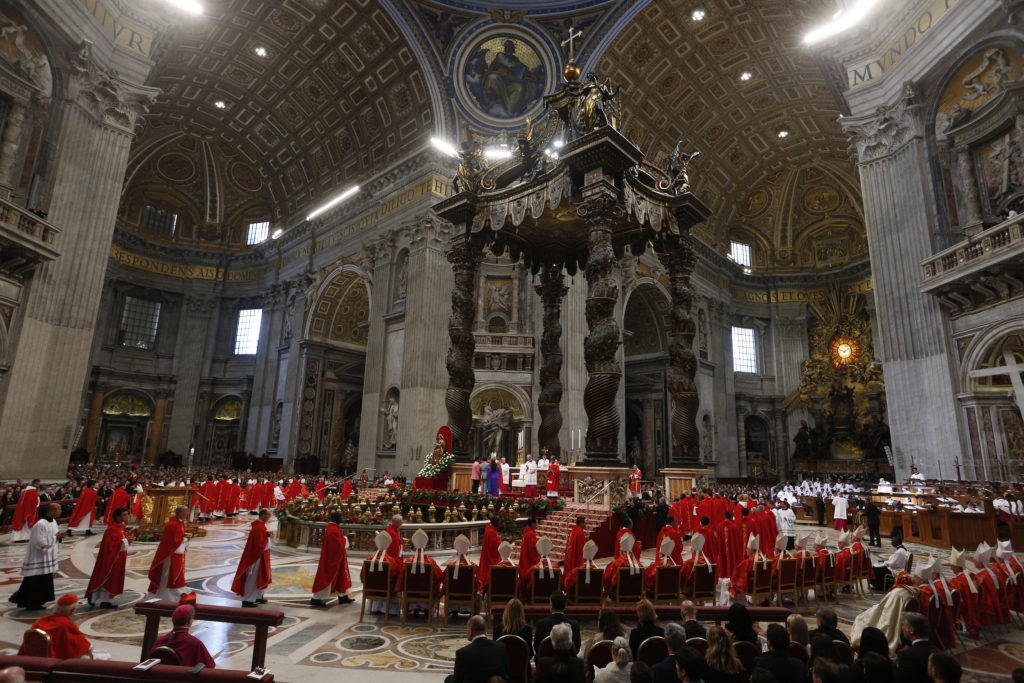
By Cindy Wooden
Catholic News Service
VATICAN CITY (CNS) — Christians should begin each day invoking the Holy Spirit, praying that the Spirit will lead them and the Church closer to God and closer to any person in need, Pope Francis said on Pentecost.
Celebrating Mass May 20 in St. Peter’s Basilica, the pope said the Bible, especially the Acts of the Apostles, makes it clear that the Holy Spirit brings a real power to change to individuals and the Church.
“The Spirit frees hearts chained by fear,” the pope said in his homily. “To those content with half measures He inspires whole-hearted generosity. He opens hearts that are closed.
“He impels the comfortable to go out and serve,” the pope continued. “He drives the self-satisfied to set out in new directions. He makes the lukewarm thrill to new dreams. That is what it means to change hearts.”
People often vow to change, but lack the power to do so, he said.
The power of the Holy Spirit is different, Pope Francis said. “It does not revolutionize life around us, but changes our hearts. It does not free us from the weight of our problems, but liberates us within so that we can face them.”
The change occurs because the Holy Spirit brings God’s forgiveness, he said. “From guilty He makes us righteous and thus changes everything.”

“By the working of the Holy Spirit, joy is reborn and peace blossoms in our hearts,” the pope said, before offering a special prayer for peace in the Holy Land, especially in Gaza where violent protests led to the deaths of 60 people in early May.
The pope prayed that the Holy Spirit would “blow upon our world the soothing warmth of peace and the refreshing cool of hope.”
In a week that included Pope Francis’ three-day meeting with the bishops of Chile to discuss the sexual abuse scandal, a meeting that ended with all the bishops offering the pope their resignations, the pope said, “frequently, even in the bleakest of times, the Spirit has raised up the most outstanding holiness! Because He is the soul of the Church, who constantly enlivens her with renewed hope, fills her with joy, makes her fruitful and causes new life to blossom.”
Pope Francis prayed that the Holy Spirit would “blow upon us, blow into our hearts and make us breathe forth the tenderness of the Father! Blow upon the Church and impel her to the ends of the earth, so that, brought by you, she may bring nothing other than you.”
After the Mass, Pope Francis went to the window of his studio overlooking St. Peter’s Square to lead the recitation of the “Regina Coeli” prayer and to announce his decision to create 14 new cardinals from 11 nations June 29, giving the red cardinal’s hat to the papal almoner, the Iraq-based patriarch of the Chaldean Catholic Church and the archbishop of Karachi, Pakistan, among others.
But first he prayed for Mary’s intercession that the church would experience “a renewed Pentecost, a renewed youthfulness that gives us the joy of living and witnessing to the Gospel and a fervent longing to be saints for God’s greater glory.”

Coming from 11 nations, the new cardinals “express the universality of the church, which continues to proclaim the merciful love of God to all people of the earth,” the Holy Father said. His list included three men over the age of 80 “who have distinguished themselves for their service to the Church.”
When the pope made the announcement, the College of Cardinals had 213 members, 115 of whom were under the age of 80 and therefore eligible to vote in a conclave to elect a new pope. Cardinal Angelo Amato, prefect of the Congregation for Saints’ Causes, was to celebrate his 80th birthday June 8.
Under Pope Francis, the idea that some Church posts and large archdioceses always are led by a cardinal is fading, but is not altogether gone. His latest choices included the papal vicar of Rome, Cardinal-designate Angelo De Donatis, and the prefect of the Congregation for the Doctrine of the Faith, Cardinal-designate Luis F. Ladaria. But other traditional cardinal sees like Venice and Milan in Italy or Baltimore and Philadelphia in the United States were not included in the pope’s latest picks.
With the new nominations, the number of cardinal-electors those under 80 and eligible to vote in a conclave will exceed by five the limit of 120 set by Pope Paul VI. But previous popes also set the limit aside without formally changing the limit.
After the consistory June 29, Pope Francis will have created almost half of the voting cardinals. Nineteen of those under 80 in late June will be cardinals given red hats by St. John Paul II; 47 will have been created by retired Pope Benedict XVI; and 59 will have been welcomed into the College of Cardinals by Pope Francis.
The new cardinals, listed in the order Pope Francis announced them, are:
- Chaldean Patriarch Louis Raphael I Sako, 69, Iraq.
- Spanish Archbishop Luis F. Ladaria, 74, prefect of the Congregation for the Doctrine of the Faith.
- Italian Archbishop Angelo De Donatis, 64, papal vicar for the Diocese of Rome.
- Italian Archbishop Giovanni Angelo Becciu, 69, substitute secretary of state.
- Polish Archbishop Konrad Krajewski, 54, papal almoner.
- Archbishop Joseph Coutts of Karachi, Pakistan, 72.
- Bishop Antonio dos Santos Marto of Leiria-Fatima, Portugal, 71.
- Archbishop Pedro Barreto of Huancayo, Peru, 74.
- Archbishop Desire Tsarahazana of Toamasina, Madagascar, 63.
- Archbishop Giuseppe Petrocchi of L’Aquila, Italy, 69.
- Archbishop Thomas Aquinas Manyo Maeda of Osaka, Japan, 69.
- Archbishop Sergio Obeso Rivera, retired archbishop of Xalapa, Mexico, 86.
- Bishop Toribio Ticona Porco, retired prelate of Corocoro, Bolivia, 81.
- Spanish Claretian Father Aquilino Bocos Merino, 80.





